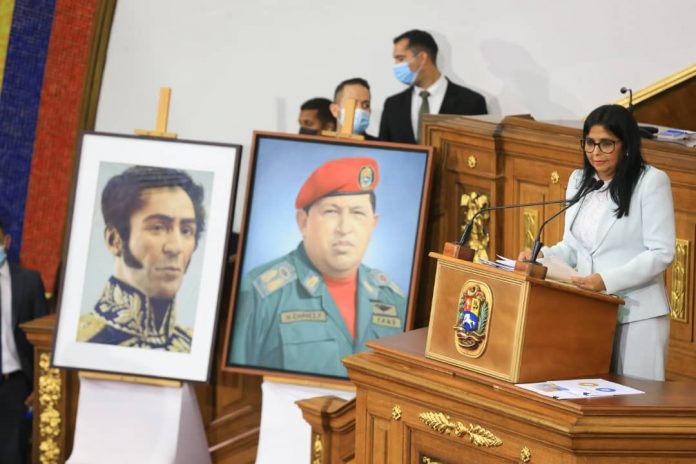By Andreína Chávez Alava
Guayaquil, Ecuador, (venezuelanalysis.com) – Venezuelan vice president Delcy Rodríguez offered a balance of the country’s growing economy in the past year amidst US sanctions.
On Tuesday, Rodríguez highlighted the gradual strengthening of Venezuela’s digital bolívar (BsD) which raised its value by six percent since July 2021, following measures to stabilize the exchange rate between the national currency and the US dollar.
“A year ago we said that the legal tender currency in our country is and will continue to be the bolívar, and today we can show significant recovery rates of our national currency and the preservation of our monetary sovereignty,” said the government official during her televised annual address before the National Assembly (AN).
According to Rodríguez, between July 2021 and February 2022 the dollar rate in the black market went up only by 15 percent, not far from the official rate, which stood at 10 percent. Previous years had seen the unofficial price of the dollar grow exorbitantly, driving up “price speculation” and “the destabilization of the national currency.”
The monetary stability has likewise spurred the country’s downward inflation spiral beginning in September 2021 after years marked by hyperinflation. “In February 2022 inflation closed at 2.9 percent, amounting to six months with single-digit inflation,” according to the country’s Central Bank. Last year’s annual inflation stood at 686.4 percent compared to 2,355.2 percent in 2020.
The stabilization of the local currency has been a government priority in recent years after a process of de-facto dollarization gripped the country. This led the executive to take a number of economic policies to solve the problem.
In August 2018, president Nicolás Maduro approved extensive tax and exchange control reforms. Later on, authorities adopted more liberal measures including the removal of forex controls, increased private capital participation in state assets, tax breaks on imports, and privileged conditions to foreign investment aided by the 2020 Anti-blockade Law. The policies have spurred criticism with some of the country’s left decrying a “rightward shift.”
In February, Venezuela’s National Assembly (AN) presented a bill to tax crypto and foreign currency transactions between two and 20 percent. The measure aims to help build up the digital bolívar and increase the nation’s taxation on wealthier sectors.
Economic turning point
Vice president Rodríguez stated that 2021 became a “turning point” for the Venezuelan economy despite crushing US sanctions. “Our revenues reached $1.7 billion in 2022 compared to just $743 million in 2020, while oil production has continued to grow.”
Additionally, in 2021 food supply grew by 69 percent when compared to 2017, and non-traditional exports went up by 76 percent. Tax collection also rose by 120 percent. According to the VP, this allowed for a recent salary hike, with the minimum monthly wage set at half a Petro now, which comes to 126 bolivars or US $30. This new income level, however, is far from covering living costs in Venezuela.
“Despite criminal [US] sanctions, Venezuela continues to be one of the least unequal countries in our region, alongside Cuba, maintaining a Gini index of 0.39,” highlighted the official and added that public services have also shown modest improvements.
Although the reduced inflationary spiral and recently increased oil revenues have seen the country’s economy grow by 4 percent last year according to government sources, the Venezuelan economy continues to be battered by a seven-year recession and longstanding recovery still depends on the lifting of US sanctions.
In 2017, the US Treasury Department imposed financial measures against state oil company PDVSA followed by an oil embargo, thus reducing the Caribbean nation’s main source of foreign income. In 2020, the former Trump administration likewise put in place secondary sanctions against any non-US person or company that carries out transactions with Venezuela.
This policy has a direct impact on revenues: “1 of every 4 dollars must be allocated to cover payments for the mobilization and marketing of our oil,” Rodríguez explained.
Since Venezuela is excluded from the international financial system, the costs for any financial transaction can go up by 20 percent.
“We wanted to present these numbers so that our people are aware of the savageness that this criminal blockade against our country represents,” concluded the official.





